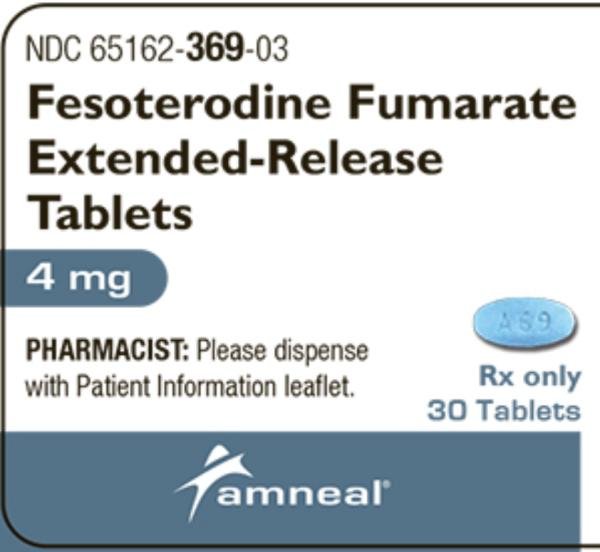Fesoterodine Disease Interactions
There are 6 disease interactions with fesoterodine.
- GI retention
- Narrow-angle glaucoma
- Urinary retention
- Hepatic dysfunction
- Myasthenia gravis
- Renal dysfunction
Fesoterodine (applies to fesoterodine) GI retention
Major Potential Hazard, Moderate plausibility. Applicable conditions: Gastrointestinal Obstruction
The use of fesoterodine is contraindicated in patients with gastric retention. Fesoterodine is a competitive muscarinic receptor antagonist and exerts direct antispasmodic effects on smooth muscles. Caution is advised even when using this agent in patients with decreased gastrointestinal motility.
Fesoterodine (applies to fesoterodine) narrow-angle glaucoma
Major Potential Hazard, Moderate plausibility. Applicable conditions: Glaucoma (Narrow Angle)
The use of fesoterodine is contraindicated in patients with uncontrolled narrow-angle glaucoma. Fesoterodine is a competitive muscarinic receptor antagonist. Its use can result in increased intraocular pressure and loss of accommodation. Caution is advised even when using this agent in patients being treated for narrow-angle glaucoma.
Fesoterodine (applies to fesoterodine) urinary retention
Major Potential Hazard, Moderate plausibility.
The use of fesoterodine is contraindicated in patients with urinary retention. Fesoterodine is a competitive muscarinic receptor antagonist and exerts direct antispasmodic effects on smooth muscles. Caution is advised even when using this agent in patients with clinically significant bladder outlet obstruction because of the risk of urinary retention.
Fesoterodine (applies to fesoterodine) hepatic dysfunction
Moderate Potential Hazard, Moderate plausibility. Applicable conditions: Liver Disease
The use of fesoterodine has not been studied in patients with severe hepatic impairment and therefore is not recommended for use in this patient population. No dose adjustment is recommended in patients with mild or moderate hepatic impairment. Use caution when using this agent in patients with severe hepatic impairment.
Fesoterodine (applies to fesoterodine) myasthenia gravis
Moderate Potential Hazard, Moderate plausibility.
Fesoterodine is a competitive muscarinic receptor antagonist. Fesoterodine should be used with caution in patients with myasthenia gravis, a disease characterized by decreased cholinergic activity at the neuromuscular junction.
Fesoterodine (applies to fesoterodine) renal dysfunction
Moderate Potential Hazard, Moderate plausibility.
Doses of fesoterodine fumarate greater than 4 mg are not recommended in patients with severe renal impairment. No dose adjustment is recommended in patients with mild or moderate renal impairment.
Switch to professional interaction data
Fesoterodine drug interactions
There are 322 drug interactions with fesoterodine.
Fesoterodine alcohol/food interactions
There is 1 alcohol/food interaction with fesoterodine.
More about fesoterodine
- fesoterodine consumer information
- Check interactions
- Compare alternatives
- Reviews (77)
- Drug images
- Side effects
- Dosage information
- During pregnancy
- Drug class: urinary antispasmodics
- Breastfeeding
- En español
Related treatment guides
Drug Interaction Classification
| Highly clinically significant. Avoid combinations; the risk of the interaction outweighs the benefit. | |
| Moderately clinically significant. Usually avoid combinations; use it only under special circumstances. | |
| Minimally clinically significant. Minimize risk; assess risk and consider an alternative drug, take steps to circumvent the interaction risk and/or institute a monitoring plan. | |
| No interaction information available. |
See also:
Further information
Always consult your healthcare provider to ensure the information displayed on this page applies to your personal circumstances.


